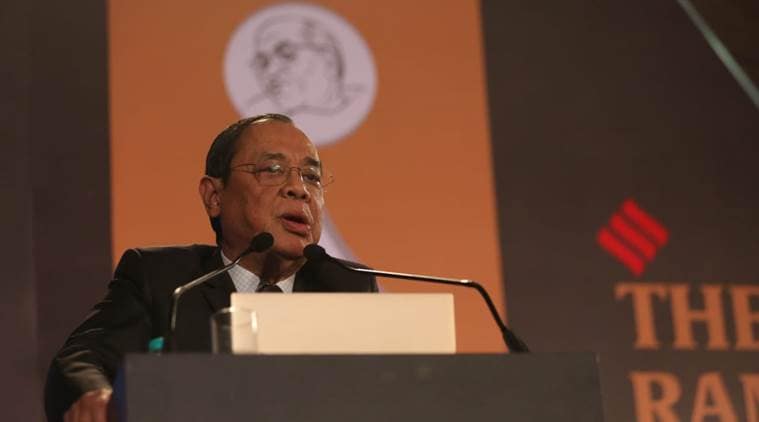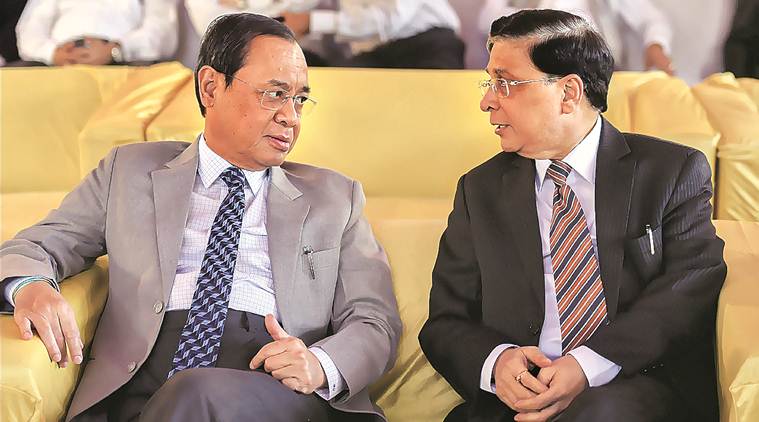 Justice Ranjan Gogoi in New Delhi. Gogoi is set to be the next chief justice of India.
Justice Ranjan Gogoi in New Delhi. Gogoi is set to be the next chief justice of India.
On August 25 this year, in Guwahati, a book titled Gauhati High Court, History and Heritage was released by Justice S A Bobde, a judge in the Supreme Court.
Judges of the Gauhati High Court present at the release speak of how it has a passage termed ‘Prophetic Comment’ which narrates an interesting anecdote when former Law Minister of Assam Abdul Muhib Mazumdar asked Kesab Gogoi, once-Chief Minister of Assam, if his son, one Ranjan Gogoi, “would also be a politician and go on to become the Chief Minister of Assam”.
Ranjan Gogoi was then “a brilliant lawyer” at Guwahati. His father Kesab Chandra Gogoi said, no, his son “would not be joining politics and would therefore not be Chief Minister of Assam but he definitely had the potential in him to be the Chief Justice of India”.
As Justice Gogoi gets set on course to meet this destiny, his colleagues in the topmost court term him as “a man of few words, strong and deep convictions and also a man of action. He speaks little but acts.”
Over the years, Gogoi has garnered a reputation for being a judge who applies his mind, is proper and holds all nature of relationships in high regard. His kept a neat house in Guwahati, recall his peers from there, with a flower garden he was exceptionally fond of.
He has been spotted buying his own fish from a government outlet in South Delhi. The fish-monger was awestruck that a “judge” came to select and choose his own dinner. He is known to be a workaholic and a keen reader of briefs, sometimes surprising lawyers by his meticulously scanning of the files.
Justice Gogoi, started his career as a Permanent Judge of the Gauhati High Court in February 2001. He went on to be transferred to the Punjab and Haryana High Court in 2010 and was appointed Chief Justice there in 2011. He came to the Supreme Court as a judge on April 23, 2012. He will be the first Chief Justice of India from the North-east.
 Chief Justice of India Dipak Misra, Justice Ranjan Gogoi. (File)
Chief Justice of India Dipak Misra, Justice Ranjan Gogoi. (File)
Justice Gogoi does not own a car and only recently his mother, Shanti Gogoi, a respected social worker in Assam, transferred an old home to him, in Kamrup district. Justice Gogoi is among the eleven (less than half) of his colleagues at the Supreme Court to have bothered and made public, his list of assets and updated it, in keeping with the resolution towards transparency in the top judiciary passed by a meeting of the full Court in May 1997.
Justice Gogoi grew upon in Dibrugarh and as those who knew him as a junior judge say; he has a “big heart but he thinks with his mind.”
After his schooling, he went on to read History at St Stephen’s College in the University of Delhi, he was a student “in residence”, and went to write an MA from the University before joining the Faculty of Law. His fellow-students, some of whom went on to share the profession with him remark as to how he was quiet and serious, a “low-key scholar”.
A senior advocate said he would, in the tradition of his training and his early days as a student, be a “no-nonsense Chief”, restoring some discipline in the proceedings. “He has already started by calling for the first set of cases to be heard only at 11.30 am, so the over-crowding of those with a hearing later in the day goes down.”
The business of a Chief Justice recommending the senior-most judge as a successor should be a routine procedure. Who will be Chief Justice and who will not is known for years in advance and the only time that it has been disrupted was during the tenure of the Prime Ministership of Indira Gandhi when two Chief Justices were brought in out of turn and three senior judges bypassed, who went on to resign.
But 2018 was anything but routine in the life of the Supreme Court. January 12, 2018 saw an unprecedented coming out by four top judges of the Supreme Court, who shared a letter they wrote to the incumbent Chief Justice Dipak Misra, raising serious questions about how cases were allocated to the Judges in the Court.
The judges who came forth and aired concerns about how the topmost Court was functioning, included Justice Gogoi. His presence drew a sharp intake of breath from all who knew of the succession planning at the Court, as it implied, risking it all — he had plenty to lose.
Ties between Chief Justice Misra and the four Judges and more went further south as questions were raised if the topmost judge was being able to resist “pressure”. Cases of sensitive import all went to the Chief Justice who heard them with no colleague in the Collegium on the bench. Misra did try and devise a “system” for rostering benches but that too did not go to won colleagues over.
The price of appointing and resisting government pressure to not appoint Justice K M Joseph also took its toll on fraternal ties between ‘Brother’ Judges, until he was finally appointed after the Collegium reiterated his name in July.
Justice Gogoi is, at present, hearing the sensitive and crucial case of the process of finalising the National Register for Citizens for Assam, which will have repercussions across the country.
There have been assertions by the topmost Court — thrice in a year — about the primacy of the Chief Justice of India being the “master of the roster.” It remains to be seen how the new “master of roster” designate exercises this supreme power.
Justice Gogoi is set to take charge of the ship at a time of turbulence, within and outside, his predecessor becoming the first Chief Justice to have an impeachment motion moved against him.
Restoring the sense that the judiciary is independent would be an important target for him. How he signals that is key. An institution builder, he made his mark since his days in Gauhati High Court, taking the lead to try and build consensus on institutional issues — picking up and identifying people to be judges, early in their life, for instance, and insisting that “integrity” must be a vital component of what is termed “merit.”
Delivering the Third Ramnath Goenka Memorial Lecture on “The Vision of Justice” on July 12, Justice Gogoi said that noisy judges and independent journalists are democracy’s first line of defence and a revolution, not mere reform, is needed to keep the institution of the judiciary responsive to the changes in society.
He said that the judiciary was the “last bastion of hope” and it needed to be “uncontaminated”, more “pro-active” and on the “front foot” to preserve its moral and institutional leverage.
“A chain is only as strong as its weakest link. So is an institution. And if introspection is where we have to begin, we might as well begin there. Perhaps, we can hope and endeavour that in the future, it is not our finality, but really the infallibility that should define us,” he said. He said the judiciary has been endowed with “great societal trust” and it is this fact that gives it credibility and legitimacy. “It is a very enviable spot for an institution,” he said. An institution that he is now set to lead.